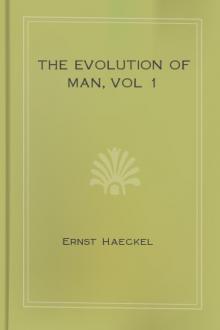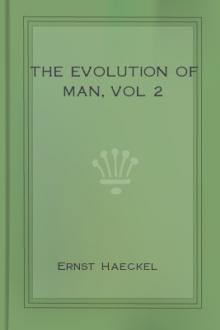Freedom in Science and Teaching. - Ernst Haeckel (mobi reader txt) 📗

- Author: Ernst Haeckel
- Performer: -
Book online «Freedom in Science and Teaching. - Ernst Haeckel (mobi reader txt) 📗». Author Ernst Haeckel
In the autumn of 1856 Virchow left Würzburg to settle in Berlin. The exchange of a narrow sphere of labours for a wider one, of small means and appliances for greater ones, proved unfavourable in this case, as in many similar cases. Since he has been in Berlin, in a "great Institution," and with luxurious appliances, all the scientific results which Virchow has as yet brought to light are not to be compared, either as to quality or quantity, to the grand and immortal achievements which he himself effected in the little institute of Würzburg with the scantiest means—a new proof of the maxim enunciated by me, and hitherto never confuted, that "the scientific results of an institute are in inverse proportion to its size." (See "The Aim and Methods of Modern Evolution."[14])
Still more grave is the circumstance that, since settling in Berlin, Virchow has more and more exchanged his theoretical scientific activity for practical political life. It is well known how prominent a part he plays there in the Prussian Chamber of Representatives, how he raised himself to be the leader of the party of progress, and, to give this political position a broader basis, took part in the representation of the citizens of the capital; how he has taken a most active interest, as city commissioner, in all the petty anxieties and concerns which the charge of such a city as Berlin entails. I am far from blaming, as many have blamed, the political and civic activity to which Virchow has indefatigably devoted his best powers. If a man feels in himself the inclination and vocation with strength and talent enough, to play a conspicuous political part, by all means let him do so; but verily I do not envy him; for the satisfaction which is derived from the most successful and fruitful political activity is not, to my taste, to be compared with that pure and disinterested satisfaction of the mind which results from absorption in serious and difficult scientific labours. In the turmoil of the political and social struggle, even the most splendid civic crown will be dulled by the stifling dust of practical life, which never reaches the ethereal heights of pure science and never rests on the laurels of the thoughtful investigator. However, as I have said, that is a matter of taste. If Virchow really believes that he is doing a greater service to humanity by his practical political life in Berlin than he formerly did by his theoretical scientific work in Würzburg, that is his affair; but for all that, in his former sphere he was incomparable, and cannot be replaced; in the latter this is not the case.
If a distinguished man, be he never so remarkable for uncommon power of work and universal gifts, passes the whole day in the friction of political party-struggles, and throws himself as well into all the petty and wearisome details of daily civic life, it is impossible for him to maintain the requisite feeling for the progress of science—particularly when it advances so rapidly and incessantly as is the case in our day. It is therefore quite intelligible that Virchow should soon have lost this feeling, and in the course of the last two decades have become more and more estranged from science. And this estrangement has at last led to so complete a change in his fundamental views, to such a metapsychosis, that the present Virchow of 1878 is hardly in a position to understand the youthful Virchow of 1848.
We have seen a similar mental change occur contemporaneously in our greatest naturalist, Carl Ernst von Baer. This gifted and profound thinker and biologist, whose name marks a new epoch in the history of evolution, had in his later years become wholly incompetent even to understand those most important problems of his youthful labours which opened up new paths of inquiry. While in his early years he laid down principles of the greatest value to our modern doctrine of evolution, and even went very near to adopting this hypothesis into his system, at a later period he utterly denied it, and by his writings on Darwinism proved that he was no longer generally capable of mastering this difficult problem. As I am one of Von Baer's warmest admirers, and in my "Evolution of Man," as well as in the "History of Creation," and in other places, have most emphatically expressed that sincere esteem, I thought I might venture to forbear from calling attention to the discrepancy between the lucid, monistic principles of Von Baer in his youth, and the confused dualistic views of his old age. But as many opponents of Darwinism—and among them particularly the Old Catholic philosopher of Munich, Huber, who has written a series of articles in the "Augsburger Zeitung"—have made constant capital out of the harmless talk of the feeble old Von Baer, I must in this place explicitly declare that this dualistic prating of the old man is quite incapable of shaking the monistic principles of the young and enterprising pioneers of science, or of giving them the lie.
In his autobiography Von Baer gives us the explanation of this striking contradiction. In 1834 he entirely and for ever abandoned the province of the history of development, at which for twenty years he had laboured incessantly, and where he had earned splendid laurels. To escape from the haunting and importunate ideas of the science which had so wholly absorbed him, he fled from Königsberg to Petersburg, and subsequently busied himself in scientific inquiries of a quite different character. Twenty-five long years passed by, and when Darwin's work appeared in 1859, Von Baer had too long undergone a metapsychosis to be able to understand it. In Von Baer, as in Virchow, the course of this remarkable metapsychosis is highly instructive, and will itself afford to the thoughtful psychologist an interesting evidence of the doctrine of evolution.
However, the lack of comprehension of our modern evolution-hypothesis is easier to explain in Virchow's case than in Von Baer's, for this reason: morphological knowledge was greatly lacking to Virchow, while Von Baer possessed it in the highest degree. Now morphology is precisely that very department of inquiry in which our theory of descent has its deepest and strongest roots, and has matured the most glorious fruits of knowledge. The study of organic forms, or morphology, is thus, more than any other science, interested in the doctrine of descent, because through this doctrine it first obtained a practical knowledge of effective causes, and was able to raise itself from the humble rank of a descriptive study of forms to the high position of an analytical science of form. It is true that by the beginning of this century the most comprehensive branch of morphology—i.e., comparative anatomy—which was founded by Cuvier and splendidly developed by Johannes Müller, had laid the foundations on which to build a truly philosophical science of form. The enormous mass of various empirical material, which had been accumulated by descriptive systematists and by the dissections of zootomists since the time of Linnæus and Pallas, had already been abundantly matured and utilised in many ways for philosophic purposes by the synthetic principles of comparative anatomy. But even the most important universal laws of organisation—of which the old system of comparative anatomy was one—had to take refuge in mystical ideas of a plan of structure and of creative final causes (causæ finales); they were incapable of arriving at a true and clear perception of effective mechanical causes (causæ efficientes). This last, most difficult, and grandest problem, Charles Darwin was the first to solve in 1859, by setting Lamarck's theory of descent, which was already fifty years old, on a firm footing by his own theory of selection. By this hypothesis it was first made possible to fit together the rich materials which had been previously amassed, into the splendid edifice of the mechanical science of form. (See my "General Morphology," vol. i. chap. iv.)
The immeasurable step which Darwin thus made in organic morphology can be adequately appreciated only by those who, like myself, were brought up in the school of the old teleological morphology, and whose eyes were suddenly opened by the theory of selection to a comprehension of that greatest of all biological riddles, the creation of specific forms. The dogma of creation, the mystic and dualistic doctrine of the isolated creation of each separate variety, was annihilated at one blow; the belief in transmutation has now for ever taken its place—the mechanistic and monistic doctrine of the metamorphosis of organic forms, of the descent of all the species of one natural class from a common parent-form. How complete a change the science of mechanical morphology has by this means been compelled to undergo, I have endeavoured to point out in my "General Morphology;" and any one who wishes to convince himself clearly of what an enormous revolution has been brought about, particularly in comparative anatomy, may compare the "Outlines of Comparative Anatomy" (Grundzüge der vergleichenden Anatomie), by Carl Gegenbaur, 1870, and the latest edition of his "Elements" (Grundrisses), with the old text-books of that science.
Virchow has no suspicion even of all these immeasurable strides in morphology, for this department always lay out of his ken. His great reforms in pathology were founded in the province of physiology, and more especially in cellular physiology. But within the last twenty years these two main branches of biological inquiry have grown more and more apart. The great Johannes Müller was the last biologist who was able to keep these departments of organic inquiry together, and who won equally immortal honours in both divisions of the subject. After Müller's death in 1858 they fell asunder. Physiology, as the science especially of the functions or living activity of the organism, addressed itself more and more to exact and experimental methods: morphology, on the contrary, as the science of the forms and structure of animals and plants, could naturally make but very small use of this method; it must take refuge more and more in the history of evolution, and so constitute an historical natural science. It was on this very historical and genetic method of morphology, in contradistinction to the exact and experimental method of physiology, that I based my Munich address; and if Virchow in his answer had really and thoroughly refuted this position, instead of fighting with mere phrases and denunciations, this radical opposition would have been well worthy of the fullest discussion. At the same time I have no wish to reproach Virchow for being wholly fettered by the one-sided views of the modern school-physiology, nor because morphology lies so far out of his ken that he has not been able to form an independent judgment of its aims and methods; but when, in spite of all this, he





Comments (0)